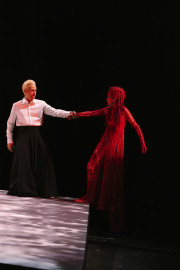Phädra, in Flammen
Phaedra, the wife of old King Theseus, is bored and frustrated by her unfulfilled dreams and dwindling zest for life. The disappointments stemming from things that are no longer possible wound her pride. She longs for freedom and new beginnings. And suddenly, SHE appears: Persea, bride-to-be of Phaedra’s first-born son, Demophon. Persea is young, rebellious, and beautiful in the most beautiful way – by insisting on being herself. Phaedra falls in love with her, unexpectedly, intensely, achingly. At the same time, King Theseus, famed for slaying the Minotaur, prepares Demophon for the throne but cannot bring himself to relinquish his power to him. The high priest and revisionist Panopeus, who always gets the short end of the stick, sees this as his chance to finally rise up in the world and to mediate between gods and humans with traditional sacrificial rituals.
Author Nino Haratischwili’s reworking of the Ancient Greek legend of Phaedra is confrontational. The award-winning playwright and novelist of such works as ”The Eighth Life (For Brilka)“ and ”Lack of Light“ does not pair the queen up with her reluctant adopted son Hippolytus, but rather with her future daughter-in-law. This forbidden relationship unleashes a political tragedy. In a way that is as brutal as it is loving, Haratischwili’s distinctive, sensual language peals back the layers to expose Phaedra’s timeless suffering as if the sensation were completely new.
-
PhädraSophie von Kessel,
-
TheseusErnest Allan Hausmann,
-
DemophonJulian von Hansemann,
-
AcamasEtienne Halsdorf,
-
PerseaElisa Plüss,
-
PanopeusPhilipp Hauß,
| Beschreibung | Information |
|---|
























